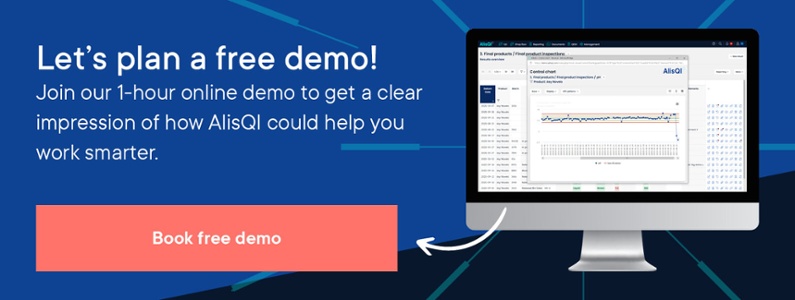In our blog on the benefits of no-code implementations, we highlighted that quality teams are best placed to take a leading role in implementing AlisQI because they are the end-users of the platform. And no-code puts them in the driving seat making the path from system to real-life effectiveness clearly visible.
Customization is another big plus – the software system can easily be adapted to manufacturing processes, providing accessible data, clear overviews, and enhanced control. This article talks about the ability to meet changing demands while having a tight grip on quality.
Strict requirements and lightbulb moments
When asked about their requirements for a QMS solution, all our customers mentioned that they were looking for a user-friendly, straightforward system that can accommodate their customization needs. Often, there are lightbulb moments even during the initial demo.
Kompak, a company that mixes and packages for big brands such as Unilever and Ecover, wanted to orchestrate its Quality Control with two discrete systems: one for LIMS and one “ERP-like, slash MRP” tool. The QESH manager demoed AlisQI for the LIMS solution but realized the system could do a lot more than that.
AlisQI could build databases, integrate easily with production and documentation systems, dashboard shop floor activity, and create insightful reports. “A huge part of what we had planned to do in a new ERP system, AlisQI could do for us,” the QESH manager says. “It was a no-brainer, particularly as ERP systems typically involve a lot of customization and have long implementation trajectories.”
Nobody wants that. “We decided there and then that we’d go for just one tool, and that was AlisQI.”
In control of change
Users of AlisQI keep making discoveries about the no-code platform. Implementation is just the first step; the more deeply AlisQI is embedded in your quality workflow and processes, the more you will want the system to do. This doesn’t – and can’t – happen all at once. Manufacturers have different needs and they each want to customize AlisQI in harmony with their unique insights and progression.
They need to change in response to changing regulations. The European Union recently published a “taxonomy” of sustainable practices, but these are expected to harden into law before long. Every industrial sector is subject to a myriad of regulations; your QMS needs to be able to absorb the inevitable changes with an agile QESH component.
The demands of the supply chain also demand agility.
Back to Kompak. Every year, 25,000 batches with hundreds of different formulations are despatched from the Kompak plant in the Dutch town of Etten-Leur. “Our customers want to have data on the release of their products,” says the QESH manager. “And not by fax, paper, or email, but instantly and 24 hours a day, by logging into AlisQI.”
One of Kompak’s first customizations was to give its suppliers access to the AlisQI platform, so the COAs for its raw materials could be coupled seamlessly with the batches in production. This saved Kompak’s suppliers a lot of time.
The next phase of the supply chain integration is to make more data sets meaningfully available to customers, such as source documents with specifications for each product. For the moment, Kompak checks internally if recipe adjustments or changes in the product labeling have been carried out correctly, but the plan is to also roll this data out to customers.
All these initiatives are planned and carried out by Kompak’s quality team. “AlisQI is adaptable,” says the Kompak QESH manager. “You can steer it towards your own processes without relying on endless IT projects over which you have no control.”
New ways to leverage no-code AlisQI
Lamers High Tech Systems is a leading system integrator and installation company with deep ties to ASML, the world’s number one supplier of photolithography systems to the chip industry. It was ASML’s demand for detailed statistical reporting that led to the implementation of AlisQI.
Lamers implemented AlisQI under its own steam, and this can-do attitude is steering further development. “We do almost everything in AlisQI,” says the Lamers QESH manager. “We try to solve as much as possible using AlisQI and if we think, ‘You know what, we should do that too’, we create a new group type so we can have that data in our platform too.”
This is the winning proposition of AlisQI, according to the Lamers QESH manager: you implement it for what you need it to do, and for how you can adapt it to do so much more once it is up and running. “AlisQI supports your PDCA cycle with ease,” he says. “You’ve got your processes, your deviations, your moments of evaluation, and your improvement cycle that can all be steered from AlisQI. The whole management process is much better supported.”
Lamers is finding unique ways to leverage the no-code platform. The company is building an entire test installation to simulate the workings of a machine for a key customer, which has a legion of complex testing and service implications. “We’ll soon be in a position where we can enter all the test configurations and data into AlisQI, and this will tell us how well we are doing.”
Every manufacturer that adopts AlisQI also adapts it. We believed from the outset that the QMS that manufacturers most needed was one that allowed them to make the critical decisions – and execute them.
Quality teams are responding to change by creating new dashboards, new KPIs, new datasets, and new insights through the application of advanced business logic to its analytics workflow.
In this way, manufacturers do not depend on software vendors to future-proof their QMS; this future they can now build themselves. Learn more about a future with no-code platform AlisQI and how the system can be customized to your needs by booking an online demo.




